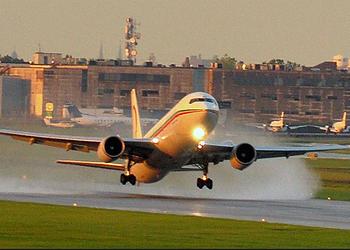
MONTREAL, Quebec, Canada, October 12, 2016 (ENS) – Carbon emissions from international civil aviation will be controlled through a new global market-based measure, government, industry and civil society representatives have agreed.
The historic move came on October 6 in Montreal as delegates to the 39th Assembly of the International Civil Aviation Organization, or ICAO, agreed to recommend adoption of a final Resolution text for the global market-based measure.

“It has taken a great deal of effort and understanding to reach this stage, and I want to applaud the spirit of consensus and compromise demonstrated by our Member States, industry and civil society,” said ICAO Council President Dr. Olumuyiwa Benard Aliu.
“We now have practical agreement and consensus on this issue backed by a large number of States who will voluntarily participate in the GMBM – and from its outset,” Aliu said.
As of October 12, 66 States, representing more than 86.5 percent of international aviation activity, intend to voluntarily participate in the global market-based measure from its outset.
ICAO’s Carbon Offsetting and Reduction Scheme for International Aviation, or CORSIA, is designed to complement the basket of mitigation measures the air transport community is already pursuing to reduce CO2 emissions from international aviation.
These include technical and operational improvements and advances in the production and use of sustainable alternative fuels for aviation.
The agreement “will permit the CORSIA to serve as a positive and sustainable contributor to global greenhouse gas emissions reduction,” said Aliu.
The CORSIA calls for international aviation to address and offset its emissions through the reduction of emissions elsewhere – outside of the international aviation sector – involving the concept of “emissions units.” One emissions unit thereby represents one tonne of CO2.
Two main types of emissions units exist: “offset credits” from crediting mechanisms, and “allowances” from emissions trading schemes.
Offsetting could be accomplished through the acquisition and redemption of emissions units arising from different sources of emissions, reductions achieved through mechanisms such as the UNFCCC’s Clean Development Mechanism, programs such as REDD+, or projects such as replacing coal-fired stoves with solar cookers.
The buying and selling of eligible emissions units happens through a carbon market.
Implementation of the CORSIA will begin with a pilot phase from 2021 through 2023, followed by a first phase, from 2024 through 2026.
Participation in both of these early stages will be voluntary.
The next phase from 2027 to 2035 would see all States on board.
Some exemptions were accepted for Least Developed Countries, Small Island Developing States, Landlocked Developing Countries, and States with very low levels of international aviation activity.
“I would like to thank all those who have been part of this process,” said ICAO Secretary General Dr. Fang Liu. “This Resolution is the reflection of the spirit of cooperation and tremendous efforts.”
Dr. Liu said, “The ICAO global market-based measure endorsed today is an important addition to the basket of measures aviation is pursuing to address CO2 emissions.”
Regardless of the phased implementation or exemptions under the CORSIA, all States with aircraft operators undertaking international flights are requested to compile and transmit aggregated emissions information of their operators to ICAO, as part of the activities included in States’ implementation of a monitoring, reporting and verification system.
Copyright Environment News Service (ENS) 2016. All rights reserved.
© 2016, Environment News Service. All rights reserved. Content may be quoted only with proper attribution and a direct link to the original article. Full reproduction is prohibited.
